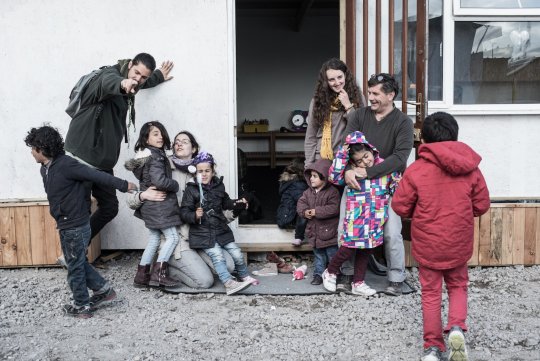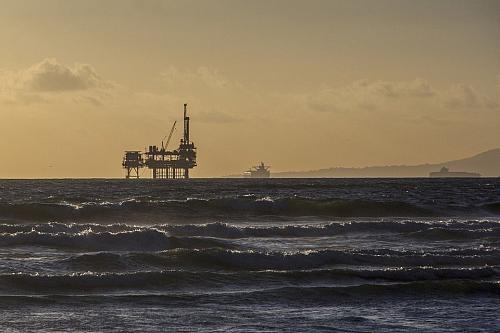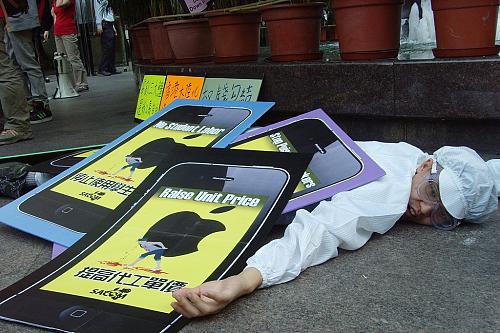Initially published in french by Basta!. Translated by Leslie Thatcher, Truth Out.
Up until recently, Carême was much less well-known than his hard right Calais colleague Natacha Bouchart, an associate of former French President Nicolas Sarkozy. However, like Bouchart, the environmentalist mayor of Grande-Synthe has had to manage the arrival in his community over the last year — and in comparable proportions — of a significant number of migrants who wish to go to the United Kingdom. For the most part, they are Iraqi Kurds. The migrants comprised 10 percent of the local population — 21,000 residents — in December 2015. The humane and determined response of Carême and his team in the face of a humanitarian crisis unprecedented since World War II terminates any comparison with Calais right there. The town of Grande-Synthe has created the first French camp that complies with United Nations High Commissioner for Refugees’ norms. That highly publicized episode — the creation of the camp — has, moreover, revealed a town pioneering in its territorial planning, which endeavors to combine ecology and the fight against social inequalities.
That Town That Invented “Guaranteed Income”
Grande-Synthe’s town hall is in the image of the city: a red brick building inaugurated in 1978. It neighbors a low-income housing project and its immense shared garden. No one goes to Grande-Synthe, the third-largest locality of the metropolitan area “Dunkirk coastal strip,” for the riches of a historical patrimony that is entirely gone. Mangled in 1940, the area was destroyed by the German army in September 1944. After the installation of the Usinor steel factory in 1958, the modest village of truck farmers underwent an urban explosion. Today, it’s a town in great difficulty, with an unemployment rate that is about three times the French national average and a low level of credentials.
In 1971, a first municipal team, brought in by [then-Mayor] René Carême, father of the present mayor, conducted a committed policy to endow the town with social and cultural facilities. A union electrician trained by the Christian Workers’ Youth (JOC) and a Socialist Party member, the municipal official’s motto was “share resources, knowledge and power.” He doubled property taxes — which are 90 percent of the town’s revenues today — and thus opened the way to an ambitious public policy, notably the creation of a “guaranteed income,” which foreshadowed the “guaranteed minimum income” established in 1988 by Michel Rocard. René Carême left the mayoralty during his fourth mandate in 1992. His son Damien took up the torch in 2001, three years before his father died where he had lived, in a modest rent-controlled home.
Renewable Energy and Free Weekend Transportation
A member of the Socialist Party who switched to Europe Écologie — the Green Party — in 2014, Damien Carême multiplies his environmental achievements in a hostile environment, influenced by the Transition Movement emerging on the other side of the English Channel. Surrounded by 14 sites classified by Seveso [the EU directive governing large quantities of hazardous substances], several kilometers away from the largest nuclear generator in Western Europe, Grande-Synthe became the global capital of biodiversity in 2010. Over half the energy consumed by the town is renewable: solar panels, windmills and “green gas” mostly sourced via the methanization of household garbage. Green spaces represent 127 square meters per resident — four times the French national average. Public transportation is free on the weekend over the whole metropolitan area, for which Carême is the delegate for social and environmental transformation, the environment, energy and transportation. In 2014, he also became the president of the Association of Town and Suburban Mayors of France (AMVBF).
One of the jewels of this innovative politics is the “coastal stadium,” which stretches over 12 hectares [about 30 acres] with three rugby pitches, two football fields, an archery shooting range, a jogging track and a bicycling ring. Launched in 2011, it is today, thanks to the acquisition of a windmill in 2013, the first renewable energy stadium in France. The other example the mayor likes to cite is the eco-neighborhood of Basroch, started up in 2013, which, [once building is complete], will have an average density of 50 living accommodations per hectare [roughly 2.5. acres], 40 percent subsidized housing accommodations and a block of communal [semi-collective] housing. Moreover, Basroch is the seat of the popular university, and up until March, received a migrant population whose numbers exploded in 2015, leading the mayor to create a new camp.
A Popular University in the Service of Residents
Grande-Synthe’s mayor has also supported the creation of a popular university, financed by city hall. Its goal is to revive popular education and its emancipatory pedagogy, abandoned by the left for 30 years. Here, as elsewhere, the mayor gives priority to the involvement of the site’s future actors. “I could care less about diplomas; what I want are militants,” Carême explains bluntly.
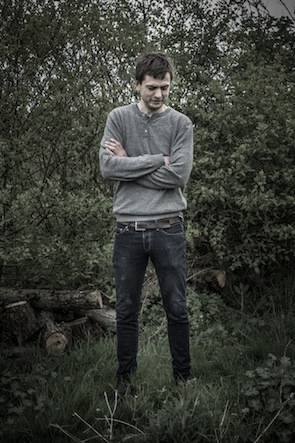
“Sociology leads to everything,” Julian Mierzejewski, municipal official and organizer of the popular university, smilingly suggests as he sorts seeds on the table of the “ecology house,” a prototype residence with very high energy performance, simultaneously perceived as a teaching tool and a display case for green architecture.
This big two-story chalet shelters a large part of the activities of “the Workshop,” as the local popular university is called. Here, three times a week, volunteer writers help residents complete a file, compose an administrative letter, fill out a questionnaire. “The idea,” Julian confides, “is that the middle classes ally with the working classes.” At the Workshop, gardeners come seeking advice and seeds. Beyond the bay window, a pilot garden stretches that is intended, among other things, to supply the town’s five gardens, planted at the feet of apartment buildings, with seeds. Parcels are granted for free to anyone who asks for one, depending on what’s available. If the fences that enclose the gardens are easily surmounted, observed damage has been minimal.
The Workshop also harbors activities around the “autonomy factory”: there, people learn to devise their economical and environmental household products or to read their water bill — including how to detect, for example, double-billing. Joining knowledge and savoir-faire, the Workshop organizes bi-monthly screenings and conference debates intended to convey alternative news to that of the traditional media, and also citizen cafés based on the exchange of knowledge and ideas. As many as 400 people participate in these activities. Finally, to give everyone access to quality products, a purchasing association has been formed to buy wholesale, directly from producers, bread and quality — organic, when possible — local fruit and vegetables.
What to Do Faced With the Arrival of 3,000 Refugees?
“These last 10 years,” Damien Carême says:
There were never more than 30 to 90 migrants in Grande-Synthe’s territory. They stayed a few days only, the time to embark on the trucks that stop at the service station on the highway that goes to England. During the winter of 2008, when the temperature went down to -15° [5 degrees Fahrenheit], we tested the installation of wood cabins in Basroch, in the area where today the new eco-neighborhood is envisaged, for the first time. But after the complete blockage of the border at Calais, in the summer of 2015, the situation became worrying. [In July 2015, a “securitized corridor” was installed to “protect” the port from the arrival of migrants. Other strategies were developed around the Eurotunnel site which have been the cause of several deaths. This year, 300 meters of wire fence will be added by the summer. Hundreds of acres of vegetation have been razed, areas have been flooded, dunes flattened. The successive expenses paid by Great Britain have reached several tens of millions of Euros.] By the end of September [2015], we counted over 500 persons; that more than tripled by the end of November, then, 2,800 by the end of December, of which 300 were children. Sanitary conditions at that point were even worse than at Calais; infections were spreading: measles, chickenpox, scabies and tuberculosis.
The necessity of a camp seemed the only conceivable solution, especially as Doctors Without Borders (MSF) committed to be responsible for a very large share of the expenses to create one — 2.5 million euros. The town advanced the remaining 700,000 euros, counting on a reimbursement from the European Community, so as not to burden the local budget. The prefect [French national government local official] did not oppose the plan, but issued an unfavorable opinion, professing security concerns. MSF’s expertise and the mayor’s determination defeated these procrastinations. The camp was created in March at Linière, an area at some distance from the town between the warehouse and the highway, while the present refugee population is 1,300 people. A petition launched in opposition to the new camp garnered only a few dozen signatures. “I believe people are mostly proud of their town,” says Carême.
“The Smiles of the Children Riding Bicycles Are My Salary Here”
For the camp to operate, there must be at least 120 personnel at all times, of whom the overwhelming majority are unpaid volunteers. In the beginning, the volunteers were coordinated by Utopia 56, an organization from Lorient created by Yann Manzi, who manages camping sites during music festivals — notably Les Vieilles Charrues. “I don’t want to be paid. I earn a good living at other things,” notes this temporary show business worker who alternates cycles of intense work with periods of release. “The smiles of the children riding bicycles are my salary here.” Her proposition to create a professionalized team was rejected, and a local association, AFEJI, which fights against social exclusion, began coordinating at the end of April. AFEJI signed a tripartite agreement with the town of Grande-Synthe and the French government on May 30. The government will be responsible for “cleaning, sanitation, 24/7 guards, social mediation and security.” Clothing and food will continue to be assured by the volunteers.
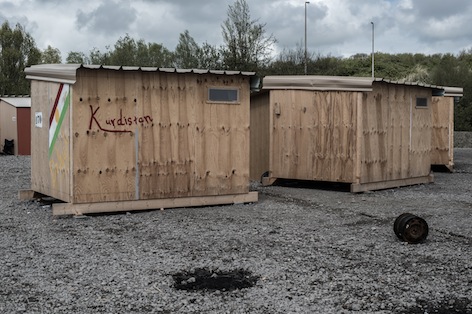
At the heart of the camp, Fulgence has taken charge of starting a school with the Edlumino association, which brings together French and British teachers who assist children in refugee camps. One building is intended for 3- to 7-year-old children, a second for 7- to 17-year-olds. Along with teaching English, teaching French — still under-represented — seems essential. At this point, 20 percent of the migrants present in the camp are requesting asylum in France. On May 12, the regional prefect announced his desire to send the children to “schools of the [French] Republic,” a surprising concern to say the least, when one knows the little attention given by state institutions to Calais’ minors, many of whom are without family.
Will the State Close the Only Approximately Suitable Refugee Camp?
The volunteers at the Grande-Synthe camp come from the United Kingdom, Belgium, Germany and all over France. They stay there for a weekend or several weeks, sometimes a few months. All or almost all are lodged for five euros per night in the bungalows of a nearby camping site. The consequence of the tasks they undertake naturally evolves with the length of their stay. The migrants stay at the camp several months, on average. Before the state announced its intention to take the camp in hand, the idea was to evolve toward a mixed and ever more autonomous management. The daily organization is not logistical only. During the day — and especially at night — one must struggle against the influence of people smugglers, who are often armed. Numerous networks have recently been dismantled.
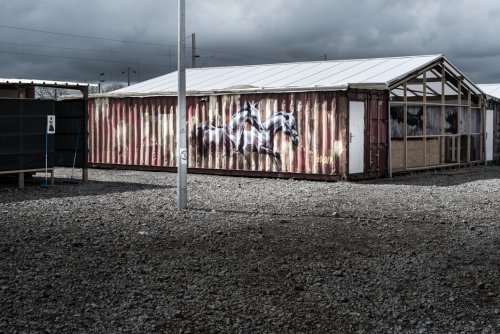
“I let the police and the criminal legal system do their job,” repeats Damien Carême, who, however, insists that the presence of the forces of order in the area surrounding the camp be reduced and discrete. The volunteers are at present responsible for securing the surroundings, notably the entries and exits of vehicles. Up until now, there has been no question of controlling the residents’ comings and goings as is done in Calais at the containers camp. Here, the priority is to provide a minimum of comfort and to make, as much as possible, this place of passage a convivial and welcoming space. The next step is the erection of an anti-noise wall to protect the migrants from the sound nuisances of the highway and prevent dangerous incursions on the road.
The cost for the annual management of the camp was initially estimated at 4 million euros — quite far from the 18 million euros for the Jules Ferry reception center in Calais for an equivalent number of migrants! Or from the 54 million euros spent for the mobilization of 18 units of mobile forces assigned for the surveillance of the shantytown and the port zone there. In mid-May, the government seemed to take in hand the Grande-Synthe project — the condition sine qua non for the financing of its upkeep. At the same time, departures gave rise to a dismantling of cabins and not to the reception of new arrivals. One may fear that, unable to prohibit its construction, the authorities are now looking to reduce the Linière camp as quickly as possible. Whatever the duration of the project, it will have shown that a respectful and dignified welcome of migrants is possible. To give it up for fear of a “magnet effect” is not only disgraceful, but absolutely groundless.
Olivier Favier
Translated by Leslie Thatcher. Copyright, Truthout. May not be reprinted without permission.
Photos : © Olivier Favier


